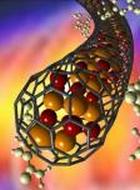 Sugar nanoparticles to help fight cancer
Sugar nanoparticles to help fight cancer
Nanoparticles made from sugars found in the human body, with a drug contained within are a method to fight cancer cells developed by Polish scientists from the Laboratory of Biomedical Engineering, Warsaw University of Technology.
"We live longer and therefore we have to get used to the fact that the
incidence of cancer will increase. Nanotechnology is a hope for a
breakthrough in cancer therapy" - head of the Laboratory of Biomedical
Engineering of Warsaw University of Technology Dr. Tomasz Ciach
explained.
Iga Wasiak, who works on developing the drug,
explained that currently fighting cancer involves administration of
medication, which cause damage not only to cancer, but also to the human
body. "They cause many weakening side effects, such as poisoning the
body, which manifest themselves, for example, with hair loss" - added
Iga Wasiak.
Nanoparticles, i.e. particles with sizes reaching one
billionth of meter, which researchers will use to treat tumours, are
tiny capsules. The use of nanotechnology allows to close medicines in an
outer capsule, which is harmless to the body, and thus greatly reduce
side effects.
Scientists from the Laboratory of Biomedical
Engineering will make nanocapsules from sugars naturally occurring in
the body. Their structure will prevent their detection by human immune
system allow them to circulate in the bloodstream seeking their target, a
tumour cell.
"We are working on dextran, a polysaccharide used
in medicine for years, as a substitute for blood plasma and in eye
drops. It is completely harmless to the body, both removed by kidneys
and metabolised by the liver into simple sugars, and indigenous in the
human body" - explained Iga Wasiak.
Dr. Ciach explained that with
the right elements present on the surface, nanoparticles will attach
themselves to the cell membrane of cancer cells, and then will be
collected by the cell to its interior. "There, the capsid structure will
be torn and the drug released" - he described. The drug will therefore
primarily enter to cancer cells, and not to other cells.
Polysaccharide
capsules will be an effective drug administration tool for another
reason. "Cancer cells have a division-oriented metabolism. For that,
they need a lot of sugar and are happy to accept it" - explained Wasiak.
Dr.
Ciach noted that with the new method classic anticancer drugs closed
inside nanoparticles can be administered in very high doses, because
they do not cause side effects. Such high doses more quickly and
effectively destroy harmful cells.
Scientists have already
conducted research on the closure of anti-leukaemia drug in capsules.
They also investigate the effectiveness of nanoparticles on cell lung,
bowel, breast and prostate cancer.
Nanoparticles developed by Iga
Wasiak can also be used in gene therapy, because after entering cells
they can activate or deactivate specific genes. "Molecules can also
contain siRNA, which allows to silence specific cellular genes. The drug
can be administered to people suffering from various genetic diseases" -
said Wasiak.
She noted, however, that scientists still have much
research to conduct. The closest step will be testing on animals. In
her view, the introduction of the drug to market is a matter of years
rather than months. (PAP)
last modification: 2011-08-01













































 Sugar nanoparticles to help fight cancer
Sugar nanoparticles to help fight cancer